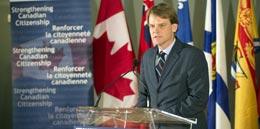Anti-immigrant, Anti-Canadian, Anti-democratic

Saying the federal government’s new citizenship legislation is anti-immigrant, anti-Canadian and anti-democratic; two legal groups are seeking your help to raise money for a constitutional challenge.
The BC Civil Liberties Association (BCCLA) and the Canadian Association of Refugee Lawyers (CARL) have filed a lawsuit arguing that the new Citizenship Act, in force since the passage of Bill C-24, creates a two-tier citizenship regime that discriminates against dual nationals, whether born abroad or in Canada, and naturalized citizens.
These Canadians will now have more limited citizenship rights compared to other Canadians, simply because they or their parents or ancestors were born in another country.
The new law could impact millions of Canadians.
Under the new law, these Canadians could see their citizenship taken away if convicted of certain serious crimes in Canada or abroad (including in a country that does not have due process or rule of law). New Canadians who became citizens after the passage of Bill C-24 could also lose their citizenship if they move abroad for work, school, or family reasons. Other Canadians would not be vulnerable to losing their citizenship.
“All Canadian citizens used to have the same citizenship rights, no matter what their origins. We were all equal under the law,” said Josh Paterson, Executive Director of the BCCLA. “Now this new law has divided us into classes of citizens—those who can lose their citizenship, and those who can’t. Bill C-24 is anti-immigrant, anti-Canadian, and anti-democratic. It undermines – quite literally – what it means to be Canadian.”
Over 110,000 Canadians have signed a Change.org petition to stop the new law. Despite the public outcry, the citizenship-stripping provisions of the Citizenship Act became law, and the federal government has already quietly begun proceedings to revoke citizenship from some individuals.
A fund raising campaign to fight the new law has been set up on www.equalcitizens.ca
Lorne Waldman, a member of the team of lawyers litigating the case and an executive member of CARL, added: “This citizenship-stripping law is unjust, legally unsound, and violates the core values of equality enshrined in the Charter of Rights and Freedoms. With this law, the federal government shows a flagrant disregard for these values, and for the basic rights of all Canadians. We are asking the court to strike the law down.”
The lawsuit further alleges that the two-tier regime is unconstitutional because it allows citizenship to be revoked by government bureaucrats, not by a court of law.
“Instead of welcoming new Canadians, the new Citizenship Act discriminates against them,” said Mitch Goldberg, President of CARL. “Bureaucrats in Ottawa will have the power to take away citizenship, and tell people that they don’t belong in this
country. This weakens citizenship for all Canadians. This lawsuit will remind the government that a Canadian is a Canadian is a Canadian. Period.”
The government of Canada has justified the new law saying that was meant to protect Canadians.
“Our Government knows that there is no higher purpose for any government than to ensure the safety and security of its citizens…that is why we are taking steps to confront the ever evolving threat of jihadi terrorism by revoking citizenship of dual nationals who have been convicted of heinous crimes such as terrorism, espionage for foreign governments or taking up arms against Canada and our brave men and women in the Canadian Armed Forces.” Chris Alexander, Canada’s Citizenship and Immigration Minister was quoted as saying.
This law affects anyone who holds or is eligible for another citizenship. Millions of Canadians fall into this category, including nearly one million dual citizens (Statistics Canada National Household Survey (NHS) 2011), plus potentially millions more of the over 32 million first, second or third generation Canadians (NHS 2011) who may, through their parents or grandparents, be eligible for the citizenship of their family’s country of origin.
Individuals could lose their citizenship if they commit, or are suspected of, certain offences or prohibited conduct. Parliament can expand the scope of “prohibited conduct” at will. In the case of those convicted abroad in systems without the rule of law, they may not have committed any crime at all.
Furthermore, the law applies to dual nationals who may not currently hold another citizenship, but are eligible for one. Just because a person is eligible for another citizenship does not mean that they will be granted that citizenship. The law could therefore render individuals stateless, in violation of international law, if they are stripped of their Canadian citizenship.
The law came into effect in June and the federal government has quietly begun the process of stripping Canadians of their citizenship.
BCCLA and CARL argue that the law is unconstitutional:
• The law violates the equality rights guaranteed to all Canadians under section 15 of the Charter. It discriminates against some Canadians and affords them more limited rights because they, their parents, or their ancestors were born in another country.
• The law breaches the right of Canadian citizens to leave and enter Canada freely under section 6 of the Charter, because it requires new Canadians to promise they intend to reside in Canada and threatens them with potential citizenship stripping if they move abroad.
• The law violates due process rights guaranteed in section 7 of the Charter, by leaving citizenship revocation decision to Ottawa officials rather than a court of law.
• The law violates section 11 of the Charter because citizenship revocation after an individual has served their sentence for a crime amounts to double punishment, which is prohibited.
• The law subjects Canadians to the punishment of exile and permanent separation from one’s home. This amounts to cruel and unusual treatment or punishment, contrary to section 12 of the Charter.
Under the current law, citizenship can be stripped mainly on the basis of crimes considered threats to national security (like terrorism or espionage) or demonstrations of disloyalty (such as treason). There is nothing, however, to stop the government from greatly expanding this list in the future.









